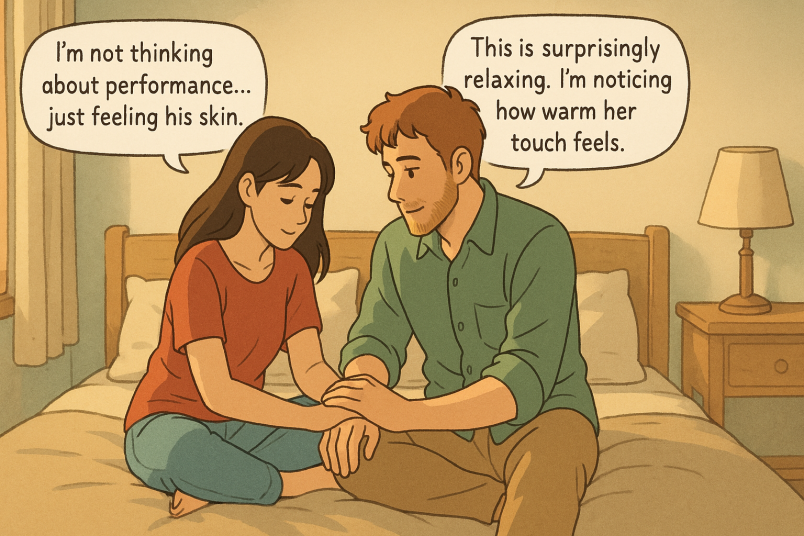7 Effective Sex Therapy Exercises to Try at Home as a Couple

Some couples talk openly about sex. Others… not so much. But wherever you land, chances are there are moments when things feel a little off—or maybe just a little quiet.
You might wonder, “Is it normal to feel disconnected?” Or ask yourself, “When did we stop touching each other just because?”
Intimacy can change; it can deepen, pause, evolve, or drift. And that’s okay.
The beautiful thing?
It doesn’t have to stay stuck. Sometimes, the softest shifts happen when we slow down, get curious, and take small steps—together.
You don’t need to be perfect, and you definitely don’t need to figure it all out at once. A few intentional moments, a little patience, and the right sex therapy exercises might be all it takes to begin again.
What is sex therapy for couples?
Sex therapy for couples isn’t about being “broken” or fixing something that’s gone wrong. It’s about understanding—yourself, your partner, your connection. Sometimes, things feel off, and you can’t quite explain why. Other times, everything looks fine on the outside, but inside… you’re not sure how to reach each other.
With the help of a trained therapist, couples explore physical and emotional intimacy at a pace that feels right. It’s not all about sex; it’s about trust, safety, and learning how to be fully present again—with your body, your heart, and your partner.
7 effective sex therapy exercises for couples at home
Even small steps can lead to powerful shifts in your relationship. These couples sex therapy exercises aren’t about pressure or performance—they’re gentle, connection-first practices you can try from the comfort of home.
Whether you’re navigating a rough patch or simply exploring each other more deeply, these ideas can help you slow down, tune in, and grow together.
1. Open communication exercises
Before touch, there needs to be trust and talking. One of the first couples sex therapy exercises many therapists suggest is practicing open communication. This isn’t about solving problems right away; it’s about creating space for honesty.
Positive relational maintenance behaviors like positivity, openness, and shared tasks strengthen romantic bonds and communication, enhancing mutual satisfaction and well-being. Survey results show these behaviors correlate positively with self-esteem, closeness, and inclusion of the partner in self-concept, supporting overall relational stability and happiness.
Try using simple prompts like “What makes you feel sexy?” or “What do you wish we’d do more often in bed?”
You’d be surprised how much can change when you feel safe saying what’s on your mind. Even a five-minute check-in before bed can make intimacy feel lighter and more open.
-
How it helps
Clear, gentle conversations reduce misunderstandings, create emotional safety, and build a bridge between your inner thoughts and your partner’s.
When you start communicating more openly, even the awkward stuff becomes less scary—and way more connecting. Over time, trust deepens, and vulnerability feels less like a risk and more like a shared language.
Here are some tips to get started safely and mindfully:
- Choose a calm, low-pressure time (not during conflict or stress).
- Sit close or hold hands if that feels natural.
- Use simple, non-blaming language like “I feel…” or “I’ve been thinking…”
- Start with 1–2 prompts only; don’t try to cover everything in one talk.
- Pause if emotions run high—revisit the topic later with care.
2. Sensate focus
Being one of the classic sex therapy exercises, it is all about slowing down. Sensate focus encourages couples to explore each other’s bodies without expectations—no pressure to perform or “get it right.” You take turns touching and being touched, just noticing sensations without judgment.
It’s not goal-oriented; it’s presence-oriented. The idea is to reconnect through mindful, non-sexual touch that may or may not lead to more. Over time, it helps rebuild trust and bring back a sense of curiosity.
-
How it helps
Sensate focus re-teaches couples how to enjoy physical closeness without pressure. It creates a shared experience that feels grounding and safe, especially if intimacy has become stressful or distant.
The more you practice, the more your body learns to relax, trust, and tune into pleasure rather than performance.
Here are some tips to get started safely and mindfully:
- Set aside 20–30 minutes in a private, comfortable space.
- Agree ahead of time that the goal is connection, not sex.
- One partner touches while the other simply receives, and then they switch.
- Stay quiet or speak gently about what feels good.
- Check-in afterward to reflect—without judgment or expectations.
3. Mindful massage
Giving and receiving a mindful massage can be incredibly grounding. It’s not about technique—it’s about attention, and it’s best done in a warm, quiet room with soft hands and no phones nearby.
Rub your partner’s shoulders, feet, or back while paying attention to breath, response, and presence. Add lotion or oil if that feels good, or don’t. This sex therapy exercise isn’t about reaching a finish line; it’s about being here, now.
-
How it helps
Mindful massage helps partners reconnect through gentle, nourishing touch. It promotes relaxation and builds a quiet kind of intimacy that says, “I’m here, I see you.”
The simple act of being fully present for one another without distractions can help couples rebuild both physical trust and emotional comfort.
Here are some tips to get started safely and mindfully:
- Choose a warm, softly lit room where you feel safe and unhurried.
- Use a gentle lotion or oil and warm it in your hands before applying.
- Start with the shoulders, hands, or feet—areas that are easy to access.
- Breathe slowly and keep your focus on your partner’s responses.
- Trade places after 10–15 minutes, or just let one person receive.
4. The yes/no/maybe list
Ever feel nervous about bringing up a new idea in the bedroom? This list takes the pressure off. You and your partner each check off things you’re open to (yes), curious about (maybe), or not into (no). Then, compare notes.
It’s a fun, respectful way to explore desires and boundaries—without awkwardness or guessing. This can be one of the most eye-opening sex therapies for couples exercises when approached with playfulness and care.
-
How it helps
By using this list, you normalize open, judgment-free discussions about boundaries and fantasies. It makes it easier to say what you want—and what you don’t—without feeling weird or ashamed.
It also shows your partner that you’re willing to meet each other halfway, creating a safer and more satisfying space for exploration.
Here are some tips to get started safely and mindfully:
- Download or create a printable list of common activities (or build your own).
- Sit side-by-side while completing it—no peeking until you’re both done!
- Compare results and talk through your yeses, maybes, and hard nos.
- Be curious, not critical—laughter and surprise are totally okay.
- Revisit the list periodically as comfort levels and interests shift.
5. Erotic journaling and sharing
Writing things down can make expressing them less scary. Spend a few minutes journaling about a memory, a fantasy, or even something you’ve been too shy to say out loud. Later—when it feels right—share what you wrote. Or don’t.
Just knowing your partner is thinking about intimacy in a thoughtful way can be comforting. These sex therapy exercises help couples express inner desires while staying emotionally connected.
-
How it helps
Erotic journaling gives you the chance to explore your desires without the pressure of a real-time reaction. It invites reflection and lets you take your time finding the right words.
Sharing your thoughts later can feel deeply intimate, especially when your partner listens with openness and curiosity instead of judgment.
Here are some tips to get started safely and mindfully:
- Set aside quiet, private time to journal—no distractions or interruptions.
- Use prompts like “What turns me on…” or “My favorite memory with you is…”
- Share your writing only if and when it feels safe to do so.
- Listen supportively when your partner shares—no teasing or dismissing.
- Keep a dedicated notebook or digital space for your shared reflections.
6. Body mapping
Gently explore each other’s bodies using touch and feedback. One partner lies down while the other uses their hands (or feathers, fabrics, etc.) to discover what feels pleasant, neutral, or not enjoyable.
It’s like a sensory map—no pressure, just curiosity. You might learn something totally new, even after years together! This kind of activity deepens trust and expands pleasure in a pressure-free way.
-
How it helps
Body mapping turns touch into a collaborative, discovery-based experience. It helps partners learn how to give and receive feedback without guilt or defensiveness.
A study of 186 young adults (18–24) found strong positive correlations between trust, intimacy, and relationship satisfaction. No gender differences were observed. Using validated scales and SPSS analysis, the results highlight that trust and intimacy significantly influence satisfaction in romantic relationships across all genders.
You’re not guessing—you’re listening, which can reduce anxiety and increase confidence. It also allows for more pleasure because you’re literally finding out what feels good for each other.
Here are some tips to get started safely and mindfully:
- Decide who will receive and who will give touch first.
- Use gentle pressure and different textures to explore.
- Ask questions like “Does this feel nice?” or “Want more/less pressure?”
- Create a 1–10 scale for feedback if verbalizing is hard.
- Switch roles after 15–20 minutes, or wait for another day.
7. The intimacy check-in
Once a week, light a candle, put away distractions, and ask each other a few tender questions. “How did I make you feel loved this week?” “What could we try to feel closer?” These soft conversations aren’t just about sex—they’re about closeness, care, and feeling seen.
Many therapists include this in their list of sex therapy exercises because emotional intimacy often fuels physical intimacy. You don’t need big answers—just presence and a little bit of heart.
-
How it helps
Regular check-ins give couples a safe ritual for emotional connection. They make it easier to share needs and celebrate small moments of love and effort.
Over time, this practice strengthens the relationship’s foundation, reminding you both that sex and affection are part of something bigger: your emotional bond.
Here are some tips to get started safely and mindfully:
- Choose a consistent day/time for your weekly check-in.
- Keep questions simple and kind—avoid heavy topics or criticisms.
- Light a candle or hold hands to create a soft, safe setting.
- Listen more than you speak; offer appreciation and understanding.
- End with a hug, cuddle, or shared moment—no phones, just each other.
What is the role of sex therapy homework exercises in this?
If you want to know how to have a better sex life—or how to make your sex life better—you need sex therapy homework exercises.
This type of marriage homework should definitely not be viewed as busy work unless one partner is present but not genuinely interested in improving their sex life. That kind of participation only wastes everyone’s time.
Now, if we move on to what the therapist defines as sex therapy homework exercises, there’s actually a great deal of value.
What you’ll learn in sex therapy is just the beginning. By engaging in these “sex exercises,” you’ll not only understand the fundamentals of what good sex looks like for each partner—you’ll also begin to broaden your horizons and try things you may never have considered before.
The more you practice what you’ve been taught through sex therapy homework exercises, the more confident and skillful you’ll become.
Good sex doesn’t just happen in one go. There’s that old cliché: practice makes perfect.
Of course, you don’t want to overdo it to the point of exhaustion… but then again, maybe you won’t want to stop until you’re completely worn out!
How to choose a qualified sex therapist
Before practicing sex therapy homework exercises from a sex therapist, do your research and make sure this person has the right academic background and credentials. Don’t assume that just because they have a bunch of initials after their name on a business card, those credentials are meaningful—or even real.
Do your research and critically question everything you read. Charlatans are, unfortunately, a dime a dozen when it comes to sex therapists. Ask where they received their training and whether they belong to any professional organizations or associations.
Only after you’ve determined the legitimacy of this professional should you schedule your first appointment.
What kind of homework should you expect?
First off, if your sex therapist doesn’t give you any sex therapy homework exercises (they may not call it homework per se, but “follow-up” or “actions to take before the next appointment”), then it might be time to find another therapist.
Sex therapy, like all therapy, is not a one-shot deal. You don’t suddenly get answers for everything that ails you in one session and walk out a new sex superstar. You have to work on the actions your therapist recommends during your appointments.
LCSW & sex therapist Danica Mitchell says,
Sex Therapy will involve lots of work on communication, education, and tasks to do at home. Many therapists use Sensate Focus as a tool to slowly build touch and intimacy over time while practicing pleasure-focused mindfulness.
Why is communication the first step?
To communicate. Communication is the number one obstacle between partners. Being open and honest can be terribly difficult for one or both partners, and the sex therapist will give you specific questions to open up channels of communication as homework.
These questions might be the same (or similar to) as these:
- When do you feel sexiest?
- When do you feel least sexy?
- What do I do in bed that you really like?
- What do I do in bed that turns you off?
- If there were one thing you’d like me to do when we’re making love that we haven’t done yet, what would it be?
The purpose of sex therapy homework exercises is to lead to better communication—specifically in the bedroom—and to build on emotional connections, thus strengthening the relationship.
The next meeting with the sex therapist may include further delving into your interpersonal communication and may involve homework questions like these:
- What have I done to make you feel loved this week? What could I do better in this regard?
- How can we make intimacy a priority?
- Tell me what you need in bed to feel pleasure.
Now, you’ve seen the sorts of questions that are used in sex therapy homework exercises given by sex therapists to help create a better sex life. Take some time this weekend—or on date night—and discuss a couple of the questions with your significant other.
To really finish off the evening (or afternoon or morning), ask your partner what they’d like for extra credit. You might want to add that spelling will indeed be graded… and no late assignments will be accepted.
5 tips that might help if one partner is hesitant
It’s completely normal for one partner to feel a little unsure about trying something new—especially when it’s intimate or unfamiliar. Hesitation doesn’t mean unwillingness; it often just means someone needs more time, reassurance, or safety. Here are a few gentle ways to ease into the process together, with care and curiosity leading the way.
1. Talk about the “why,” not just the “what”
Instead of focusing on the details of the exercise, share why it matters to you. Maybe you miss feeling close or want to explore something new together.
When your partner understands the emotional reason behind it, they may feel less guarded. Connection becomes the goal, not performance.
- Bonus point: Use phrases like “I feel closer when we…” or “I’d love for us to try this together.” Keep the tone soft and personal—it helps make the conversation feel like an invitation, not a request.
2. Start small and keep it light
You don’t have to dive in all at once! Choose one low-pressure exercise that doesn’t involve physical touch, like answering a single question over coffee.
Keep the tone playful or curious. Little steps can be just as meaningful as big ones.
- Bonus point: Label your first try as a “test run” or “mini experiment.” That language helps reduce pressure and reminds you both that it’s okay to take things slowly and even laugh along the way.
3. Create a no-pressure agreement
Make it clear that participation is voluntary, and either of you can pause or stop at any time. This safety net can reduce anxiety and increase willingness.
Knowing they won’t be judged—or pushed—can help your partner feel more in control and open.
- Bonus point: Say something like, “We can stop whenever it doesn’t feel good.” Then, actually honor that promise—it builds trust for the next time and the time after that.
4. Try sharing your own experience first
Sometimes, it helps to go first. Share a journal entry, answer a prompt aloud, or reflect on how an exercise made you feel.
Modeling openness without expecting anything in return creates emotional safety… and it might just inspire your partner to join in.
- Bonus point: Keep it short and sincere. Even saying, “I felt a little nervous too, but I actually liked it,” can go a long way in making your partner feel less alone in their hesitation.
Watch this video where Emma McAdam, an MFT, helps you understand how to build emotional safety for healthy relationships:
5. Be patient—and don’t take it personally
It can be tough when someone you love seems hesitant, but it’s not a rejection of you. Everyone moves at their own pace.
Your patience and understanding might be the very thing that helps your partner lean in, little by little, over time.
- Bonus point: Focus on emotional wins, not immediate results. Even a “Maybe I’ll think about it” is progress. Celebrate the small shifts—they add up more than you think.
Deepen trust and connection
Rebuilding intimacy doesn’t have to be loud or dramatic—it can start with a soft touch, a curious question, or even a shared moment of laughter. These sex therapy exercises aren’t about fixing what’s broken; they’re about finding your way back to each other, one gentle step at a time.
You don’t need perfect words or flawless timing… just a little openness, a little patience, and a willingness to show up. Some days will feel easier than others—and that’s okay.
What matters most is that you’re choosing connection, again and again, in the quiet ways that often mean the most.
 Tips
Tips
Write your tip or submit a video tip
All tips are reviewed before the publishing.
Share this article on
Want to have a happier, healthier marriage?
If you feel disconnected or frustrated about the state of your marriage but want to avoid separation and/or divorce, the marriage.com course meant for married couples is an excellent resource to help you overcome the most challenging aspects of being married.
Recent Articles
Related Quizzes
 We'd love your feedback!
We'd love your feedback!
 Expert Q&A
Expert Q&A
Ask your question related to this topic & get the support you deserve from experts.




















 Thanks for your feedback!
Thanks for your feedback!